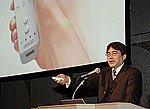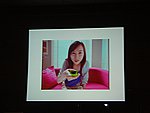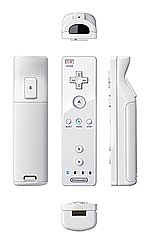Features// Tokyo Game Show: Nintendo - Revolution, more...
A sense of something very new
Microsoft took to the TGS Forum stage first, on Friday morning at 10am, before a packed hall of Japanese and international press. The hall was shared with Nintendo, whose president Satoru Iwata appeared afterwards, and both company's employees were in attendance to eye up each other's plans for the next generation of gaming in Japan.
No one could quite have anticipated what Nintendo was about to show us. After sitting through a remarkably tame and misguided Microsoft presentation, which even had some NCL employees quietly chuckling (the painful details of which we'll bring you tomorrow), a ten-minute break took us into Satoru Iwata's enthralling keynote address.
After highlighting the past two years' remarkable upturn in the Japanese market's fortunes (thanks, Iwata pointed out, largely to the release of the DS), Iwata commented: "We are at a crossroads, I believe. We need to abandon the memories of past success and get back to the basics. We have to reengage the people who have stopped playing videogames." And this, he continued, was already being effected by the DS. Retailers have apparently told Nintendo that due to its Famicom Mini GBA series (somewhat conversely) and the DS, "dormant customers are returning to the stores." At which point Iwata reminded us of Mario Bros.' 20th birthday and a previously invisible Miyamoto stood up in the third row and said "thanks" to great applause.
Iwata continued to speak of the DS' success in bringing older and female players to the fold, aided by a series of graphs and charts. The DS game Touhoku University's Adult Brain Training has apparently "caused a buzz among senior citizens."
Next up was a wi-fi DS announcement, confirming Animal Crossing: Wide World and Mario Kart DS as the wi-fi-championing titles due for release in November. Added to this, Nintendo will set up wi-fi hotspots at retailers across Japan and enable users to play compatible games there for free, effectively hooking up the entire nation of DS owners without any monthly fees whatsoever. Iwata also promised a "harassment free" environment online thanks to Nintendo's own protective measures.
After what seemed like a duration longer than an irrelevant second-leg involving Chelsea, Iwata cut to the chase and informed us that his "prelude" had been going on for long enough. Immediately snapping to control talk, Iwata explained: "I have had a growing sense of crisis. The game control mechanism has become more and more sophisticated. Those who are not sure if they have nimble enough fingers will shy away. But we can encourage everyone to play games with fresh excitement from the same starting point." Then, alluding to the Revolution controller, he added: "Those who are not playing videogames will say, 'I can do it and I can touch it'."
Cue a movie which showed people of all ages and both sexes enjoying the delights of baseball, fishing, drumming, tennis, while others were conducting orchestras and performing dental surgery. It was a very neatly put together video and, although it didn't feature game footage of any sort, it was immediately apparent that the controller bore great resemblance to a TV's remote control and that its movement could be sensed by the Revolution.
Indeed, the controller can be held in one hand and is wireless. Revolution can detect the distance and angle of the controller from the screen. So wherever the controller is moved its position can be tracked. For the games Nintendo wants to make (and those it wants to encourage other developers to experiment with), the Revolution controller will provide a virtually limitless range of options. Iwata himself admitted "looking forward to finding out how Zelda and Mario can make use of the new controller." (Although a Zelda hint was surely given in the sword-swiping section of the video.)
No one could quite have anticipated what Nintendo was about to show us. After sitting through a remarkably tame and misguided Microsoft presentation, which even had some NCL employees quietly chuckling (the painful details of which we'll bring you tomorrow), a ten-minute break took us into Satoru Iwata's enthralling keynote address.
After highlighting the past two years' remarkable upturn in the Japanese market's fortunes (thanks, Iwata pointed out, largely to the release of the DS), Iwata commented: "We are at a crossroads, I believe. We need to abandon the memories of past success and get back to the basics. We have to reengage the people who have stopped playing videogames." And this, he continued, was already being effected by the DS. Retailers have apparently told Nintendo that due to its Famicom Mini GBA series (somewhat conversely) and the DS, "dormant customers are returning to the stores." At which point Iwata reminded us of Mario Bros.' 20th birthday and a previously invisible Miyamoto stood up in the third row and said "thanks" to great applause.
Iwata continued to speak of the DS' success in bringing older and female players to the fold, aided by a series of graphs and charts. The DS game Touhoku University's Adult Brain Training has apparently "caused a buzz among senior citizens."
Next up was a wi-fi DS announcement, confirming Animal Crossing: Wide World and Mario Kart DS as the wi-fi-championing titles due for release in November. Added to this, Nintendo will set up wi-fi hotspots at retailers across Japan and enable users to play compatible games there for free, effectively hooking up the entire nation of DS owners without any monthly fees whatsoever. Iwata also promised a "harassment free" environment online thanks to Nintendo's own protective measures.
After what seemed like a duration longer than an irrelevant second-leg involving Chelsea, Iwata cut to the chase and informed us that his "prelude" had been going on for long enough. Immediately snapping to control talk, Iwata explained: "I have had a growing sense of crisis. The game control mechanism has become more and more sophisticated. Those who are not sure if they have nimble enough fingers will shy away. But we can encourage everyone to play games with fresh excitement from the same starting point." Then, alluding to the Revolution controller, he added: "Those who are not playing videogames will say, 'I can do it and I can touch it'."
Cue a movie which showed people of all ages and both sexes enjoying the delights of baseball, fishing, drumming, tennis, while others were conducting orchestras and performing dental surgery. It was a very neatly put together video and, although it didn't feature game footage of any sort, it was immediately apparent that the controller bore great resemblance to a TV's remote control and that its movement could be sensed by the Revolution.
Indeed, the controller can be held in one hand and is wireless. Revolution can detect the distance and angle of the controller from the screen. So wherever the controller is moved its position can be tracked. For the games Nintendo wants to make (and those it wants to encourage other developers to experiment with), the Revolution controller will provide a virtually limitless range of options. Iwata himself admitted "looking forward to finding out how Zelda and Mario can make use of the new controller." (Although a Zelda hint was surely given in the sword-swiping section of the video.)
Read More Like This
Comments
o mg nintendo will rule the world of gaming with this
[17 Sep 2005, 09:03: Message edited by 'DoctorDee']
[17 Sep 2005, 09:03: Message edited by 'DoctorDee']
o mg nintendo will rule the world of gaming with this
more comments below our sponsor's message
Eeeumh... i hope the admins here ban people for these kind of 'elaborate' editorials... seriously
At least it was mercifully brief.



